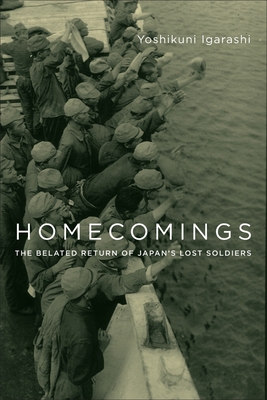

 Columbia University Press
Columbia University Press
Homecomings: The Belated Return of Japan's Lost Soldiers


Key Metrics
- Yoshikuni Igarashi
- Columbia University Press
- Paperback
- 9780231177719
- 8.9 X 5.9 X 0.8 inches
- 1.05 pounds
- History > Asia - Japan
- English
 Secure Transaction
Secure TransactionBook Description
Homecomings tells the story of these late-returning Japanese soldiers and their struggle to adapt to a newly peaceful and prosperous society. Some were more successful than others, but they all charted a common cultural terrain, one profoundly shaped by media representations of the earlier returnees. Japan had come to redefine its nationhood through these popular images. Yoshikuni Igarashi explores what Japanese society accepted and rejected, complicating the definition of a postwar consensus and prolonging the experience of war for both Japanese soldiers and the nation. He throws the postwar narrative of Japan's recovery into question, exposing the deeper, subtler damage done to a country that only belatedly faced the implications of its loss.
Author Bio
Yoshikuni Igarashi’s research focuses on Japanese cultural history during the interwar and post-World War II periods. His first book, Bodies of Memory: Narratives of War in Postwar Japanese Culture, 1945-1970 (Princeton UP, 2000), reads the absent presence of war memories in post-WWII Japan.
By examining the tension between the repression and the expression of the trauma of the war, it contemplates the impact of the war and defeat on postwar Japanese society. Igarashi’s second book, Homecomings: The Belated Return of Japan’s Lost Soldiers (Columbia UP, 2016) discusses the former soldiers who belatedly returned to postwar Japan after the end of the Asia Pacific War.
It pays particular attention to Japanese POWs detained in Siberian labor camps and soldiers who survived in the jungles of the South Pacific for more than a quarter century. Igarashi’s third book, Japan circa 1972: Masculinity in the Age of Mass Consumption and Metavisuality (Columbia University Press, forthcoming) focuses the radical economic, social, and cultural transformation of Japanese society in the late 1960s and early 1970s, stemming from the development of mass consumer society, and analyzes Japanese society’s anxiety-ridden and often violent responses to that transformation.
Source: Vanderbilt University
Videos
No Videos
Community reviews
Write a ReviewNo Community reviews